- Home
- Alex Archer
The Golden Elephant
The Golden Elephant Read online
Table of Contents
Chapter 1
Chapter 2
Chapter 3
Chapter 4
Chapter 5
Chapter 6
Chapter 7
Chapter 8
Chapter 9
Chapter 10
Chapter 11
Chapter 12
Chapter 13
Chapter 14
Chapter 15
Chapter 16
Chapter 17
Chapter 18
Chapter 19
Chapter 20
Chapter 21
Chapter 22
Chapter 23
Chapter 24
Chapter 25
Chapter 26
Chapter 27
Chapter 28
Chapter 29
Chapter 30
Chapter 31
Chapter 32
“You aren’t going to leave me to drown!”
The astonishing thought distracted Annja from the floodwaters until they rose above the tops of her waterproofed shoes. Their touch was as cold as the long-dead Emperor’s.
“At least leave me my pack!” Annja shouted, jumping up and swiping ineffectually at the dangling rope-end. She only succeeded in making it swing. She fell back with a considerable splash.
“I’m afraid not,” the woman called. “You have to understand, Ms. Creed. There are two ways to do things—the hard way and the easy way.”
Annja stood for a moment with the water streaming past her ankles. The words were so ridiculous that her mind, already considerably stressed by the moment, simply refused to process them.
Then reality struck her. “Easy?” she screamed. “Not Easy Ngwenya?”
Annja stared. The chill water reached her knees. She stood, utterly overwhelmed by the realization that she had just been victimized by the world’s most notorious tomb robber.
Titles in this series:
Destiny
Solomon’s Jar
The Spider Stone
The Chosen
Forbidden City
The Lost Scrolls
God of Thunder
Secret of the Slaves
Warrior Spirit
Serpent’s Kiss
Provenance
The Soul Stealer
Gabriel’s Horn
The Golden Elephant
ROGUE ANGELTM
Alex Archer
THE GOLDEN ELEPHANT
1
Tomb of the Mad Emperor
“Oops,” Annja Creed said as she felt something give beneath the cleated heel of her Red Wing walking shoe.
The floor of the passageway was caked inches thick in dust. Annja couldn’t see the trigger. She had sensed more than heard something like a twig snapping.
Already in motion, Annja dived for the floor. She heard a grind, a rumble, a rusty creaking. Then with a hefty metallic sound something shot from the stone walls above her.
Catching herself on her hands, Annja looked around by the light of her bulky hand lantern, which lay several feet ahead of her. She spotted three bronze spears spanning the two-yard-wide corridor a yard above the floor. They were meant to impale any unwary intruder. That included her.
Annja shook her head. “Emperor Lu may or may not have been crazy,” she muttered. “But he sure was paranoid.”
The echoes of her words chased each other down the slanting corridor, deep into the earth’s dark recesses.
CAUTIOUSLY ANNJA WIGGLED forward. As her weight came off the hidden floor plate the spears began to retract into the walls. By the time she reached her lantern they had vanished. The stone plates that covered the ports through which the spears had thrust out swung back into place.
Coughing on the dust she had stirred up doing her snake act, Annja sat up and shone her light on the walls. She could see no sign of where the spears had come from. The walls had been painted with some kind of murals, perhaps once quite colorful. They had faded to mere swirls and suggestions of faint color. They worked to camouflage the trap, though.
She shook her head and picked herself up. “Got to move,” she told herself softly as she dusted off the front of her tan shirt and khaki cargo pants. This would be her only shot. With the construction of a giant dam nearby, the floodwaters were rising. By tomorrow they would make the subterranean tunnels unsafe.
With redoubled caution she made her way deeper into the lost emperor’s tomb.
The corridor walls were hewed from a yellow limestone. Tests showed it had been quarried in some hills several miles away. The passageway air was cool and dry. It smelled of stone and earth.
Some indeterminate distance down, as Annja began to feel the weight, not just of years, but of millions of tons of earth pressing upon her, the corridor leveled. It had taken several bends and a couple of doglegs, and had plateaued briefly, as well. Annja wasn’t sure whether the zigs and zags had some ritual significance, were meant to additionally befuddle an interloper or were simply to prevent a cart full of spoil from running all the way back down to the bottom during the digging of the corridor. She suspected it was all of the above.
Far down the hallway, in which she could just stand upright, Annja saw that something was blocking the way. Could that be the door to Lu’s actual tomb? she wondered. Her heart beat quickened. According to the ground-penetrating radar scans, it could be. The last Chinese team to come down here had intended to open the bronze door to the burial chamber proper. She had no idea whether they had or not.
The Beijing University officials who had hired Annja suggested that they felt the last team had indeed made some major discoveries and had then departed by some currently unknown entrance to the great mound before vanishing. There was nothing intrinsically unlikely about that. Such huge structures often had multiple entrances. But she was being asked to play archaeology cop—to find out if the tomb had been plundered and, if possible, to trace the thieves. She was certainly willing enough. Like any real archaeologist she had an unremitting hatred of tomb robbers.
“Of course that assumes a lot of ifs,” Annja said aloud. Her voice, echoing down the chamber, reassured her. Something about the place bothered her.
She flashed her light down the corridor. She thought she saw a hint of green from the obstruction. She knew that was consistent with bronze doors. The copper in the alloy turned green as it oxidized. Otherwise bronze wasn’t prone to corrosion, as iron and steel were.
I wonder if I should have looked more closely for bloodstains around those spear traps, she thought. The two expeditions that had returned had warned about various booby traps.
But she wasn’t here to do forensic work. Time pressed. So did the billions of tons of water that would soon be rushing to engulf the mound.
As she moved forward toward the door she became aware of a strange smell. A bad smell, and all too familiar—the stench of death.
It grew stronger as she approached the door. And then she fell right into another of Emperor Lu’s little surprises.
The floor tipped abruptly beneath her. The right side pivoted up. She dropped straight down.
Without thought she formed her right hand into a fist. Obedient to her call, the hilt of the legendary blade of Joan of Arc filled her hand. Falling, she thrust the sword to her left and drove it eight inches into the pit’s wall.
It was enough. Grabbing the hilt with her left hand, as well, she clung desperately and looked down.
The hint of scent had become a foul cloud that enveloped her. She choked and gagged. The floor trap was hinged longitudinally along the center. The pit was twenty feet long and sank at least twelve feet deep. Bronze spearheads jutted up from the floor like snaggled green teeth.
Entangled and impaled among them, almost
directly below her, lay a number of bodies. She couldn’t tell exactly how many; they had become tangled together as they fell onto the spears. The glare of her lantern, which lay tilted fortuitously up and angled in a corner, turned them into something from a nightmare.
One man hung alone to one side, bent backward. His mouth was wide open in a final scream at the spearhead that jutted two feet upward from his belly. The remnants of what looked like a stretcher of sorts, possibly improvised out of backpack-frames, lay beneath him.
At the shadow-clotted base of the pit she could just make out the dome of a skull or the multiple arch of a rib cage protruding from ages of drifted dust. The missing Chinese archaeology team were not the first victims.
She looked up. She had fallen only a couple of yards below the pit’s lip. The sword had entered the wall blade-vertical. It flexed only slightly under her weight. She knew it could break—the English had done it, when they burned its former holder at the stake—but it didn’t seem strained at the moment.
Unwilling to test it any longer than she had to, she swung back and forth experimentally, gaining momentum. Then she launched her legs back and up and let go.
Whatever kind of graceful landing she was hoping for didn’t happen. Her legs and hips flopped up onto the floor. Her head and upper torso swung over empty space—and the waiting bronze spearheads. As her body started to topple forward she got her hands on the rim of the pit and halted herself. Her hair escaped from the clip holding it to hang about her face like a curtain.
With something like revulsion she threw herself backward. She sprawled on her butt and elbows, scraping the latter. Then she just lay like that awhile and breathed deeply.
The sword had vanished into the otherwhere.
One thing her life had taught her since she had come, unwittingly and quite unwillingly, into possession of Joan of Arc’s Sword was to bounce back from the most outlandish occurrences as if they were no more significant or unusual than spilling a cup of coffee.
“That got the old heart rate going,” she said.
She slowly got to her feet. The trapdoor swung over and began to settle back to the appearance of a normal, innocuous stretch of floor. As it eclipsed the beam of her lost lamp, shining up from the pit like hellfire, she reached up to switch on her headlamp. Its reassuring yellow glow sprang out as the glare was cut off.
It wasn’t very powerful. The darkness seemed to flood around the narrow beam, with a palpable weight and presence. “It’ll be enough,” she muttered. “It has to be.”
Putting her back to the left-hand wall, she edged down the corridor. The dust, which had settled in the past few weeks, hiding the doomed expedition’s footsteps, had been dumped into the pit, except for a certain quantity that still swirled in the air and rasped her lungs like sandpaper. The clean patch of floor, limned by the white light shining from below, made its end obvious.
Cautiously she moved the rest of the way down the corridor toward the green door. No more traps tried to grab her.
As she’d suspected, the door was verdigrised bronze. It had a stylized dragon embossed on it—the ancient symbol of imperial might. She hesitated. She saw no obvious knob or handle.
Reaching into her pocket for a tissue to cover her hand, she pushed on the door. It swung inward creakily. She had to put her weight behind it before it opened fully.
A great wash of cool air swept over her. Surprisingly, it lacked the staleness she would have expected from a tomb sealed for two and a half millennia. Bending low, she stepped inside.
The tomb of Mad Emperor Lu was almost anticlimactic. It was a simple domed space, twenty yards in diameter, rising to ten at the apex, through which a hole about a yard wide opened through smooth-polished stone. Annja wondered if had been intended to allow the emperor’s spirit to depart the burial chamber.
Dust covered the floor, a good four inches deep, so that it swamped Annja’s shoes. In the midst of the dust pond stood a catafalque, four feet high and wide, eight feet long. On it lay an effigy in what appeared to be moldering robes, long cobwebbed and gone the color of the dust that had mounded over it, half obscuring it. A second mound rose suggestively by the feet.
Annja dug her digital camera from her pack. She snapped several photos. The built-in flash would have to do. Feeling time and the approaching floodwaters pressing down, Annja moved forward as cautiously as she could through the dust. Her archaeologist’s reflex was to disturb things as little as possible.
But that wasn’t the reason for her deliberation. Soon all this would be underwater—a great crime against history itself, but one about which she could do nothing. She still sought to do as little damage as possible, in hopes someday the artificial lake might be drained and what the water left of the tomb properly excavated. She was more worried about stirring a cloud of blinding dust.
And more traps.
Uneventfully she reached the foot of the bier. On closer inspection the reclining figure seemed to be a mummy rather than an effigy. Annja presumed it was the man himself, Emperor Lu, his madness tempered by age and desiccation and, of course, being dead. It still gave her a shiver to be in the presence of such a mythic figure.
“This isn’t right,” she said softly. She felt a great sorrow mixed with anger that this corpse, this priceless relic, was soon to be desecrated, and almost certainly to decay to nothing in the waters of a new lake. She thought about trying to carry it out with her.
She sighed and forced herself to let the inevitable happen. She snapped some shots of the old guy, though, from several angles, always being careful where she put her feet, lest the floor swallow her up and dump her down another awful chasm.
But Lu seemed to have no more surprises awaiting intruders upon his celestial nap. Surprisingly little did await the intrepid tomb robber, leaving aside the august but somewhat diminished imperial person. Except, perhaps, that mound by the mummy’s feet.
She finished recording Lu for posterity and knelt by the foot of the bier. The mound was about as wide as a dinner plate and four or five inches high. Gently Annja brushed dust away with her hands.
In a moment she uncovered the artifact—a beautiful circular seal of milky green jade, six inches wide and a good inch thick, engraved with the figure of a sinuous dragon. It was Lu’s imperial seal, beyond doubt. Annju’s heart caught in her throat. Bingo, she thought. Properly displayed in some museum, it would be a worthy relic of Mad Lu’s long-forgotten reign.
Reverently she reached out and touched it. The green stone was smooth as a water-polished pebble. It was hard, yet seemed to have some sort of give, as if it were a living thing and not a carved stone artifact. The workmanship was fully as exquisite as might be expected. Each of the toes on the dragon’s feet was clearly visible, and the characters inscribed around it stood in clear relief. To hold such an object in her hand was itself a reward—reminding her, half-guiltily, how abundantly she would have earned her commission.
A rustle of movement tickled her ear in the stillness of the tomb—a dry creaking, a soft sound as of falling dust. A flicker of motion tugged at her peripheral vision.
She turned. Emperor Lu was sitting up on his bier. The shriveled face with its empty eye sockets looked not just mad, but angry.
Annja gasped.
For a moment she crouched there clutching the jade and staring at its moldering owner like a deer caught in the headlights. And then a great downward geyser of water shot out of the ceiling, drowning the mummy and knocking Annja sprawling.
She was washed toward the bronze door on a torrent of glutinous mud. For a moment the wildly spiraling beam of her headlamp illuminated the mummy. It sat there on its catafalque in the midst of the stream as if taking a shower. The jaw had fallen open, she could clearly see. It was as if Lu laughed at her—enjoying his final joke on the woman who had despoiled his tomb.
Then the water obscured her sight of him. She managed to get onto her feet against the rushing torrent. She scrambled out with the water sloshing
around her shins.
Annja realized the corridor was only flat relative to the steep decline she had descended, for it filled with water more slowly than it would have if level. Out of options, she ran for all she was worth. The quick death of tripping some trap, previously discovered or not, and being impaled with ancient spears seemed infinitely preferable to being trapped down here to drown in the dark. The prospect woke a whole host of fears in Annja’s soul, like myriad rats maddened by an ancient plague.
She vaulted the hinged-floor trap, still outlined in thin white lines of light, without hesitation. Her long jump wasn’t quite good enough. The floor pivoted heart-wrenchingly beneath her feet. Adrenaline fueled a second frantic leap that carried her to safety. She raced up the steeper tunnel as the water gurgled at her heels.
It followed her right up the ramp. The place was seriously shipping water. She wondered why the passageway wasn’t fatally flooded already.
That made her run the faster. Her light swung wildly before her.
But even under the direst circumstances Annja never altogether lost her presence of mind. A part of her always kept assessing, evaluating, even in the heat of passion. Or panic.
Since survival in the current situation didn’t require fast thinking so much as fast legwork, she realized why the air in the tomb had not been stale and why dust had settled so deeply on the floor and upon the emperor.
That hole in the ceiling may or may not have been a celestial escape route for Lu’s soul. It certainly was an air shaft. No matter how disposable labor was in his day—and she suspected that it was mighty disposable indeed—Lu had to know his tomb would never get built if the laborers kept dropping dead of asphyxiation the moment they reached the work site. Not to mention the fact that in those days skilled masons and engineers weren’t disposable, and had he treated them that way, his tomb never would’ve been built in the first place.

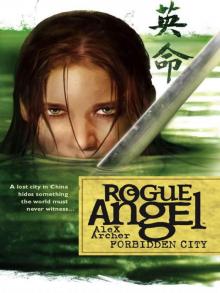 Rogue Angel: Forbidden City
Rogue Angel: Forbidden City The Spider Stone
The Spider Stone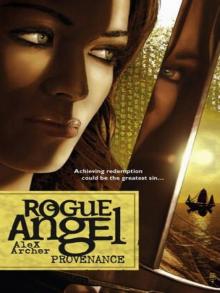 Provenance
Provenance Blood Cursed
Blood Cursed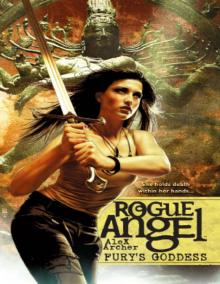 Fury's Goddess
Fury's Goddess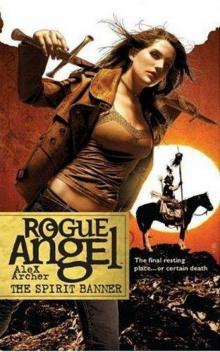 The Spirit Banner
The Spirit Banner Footprints
Footprints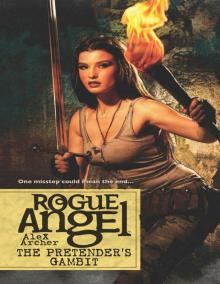 The Pretender's Gambit
The Pretender's Gambit Rogue Angel: The Lost Scrolls
Rogue Angel: The Lost Scrolls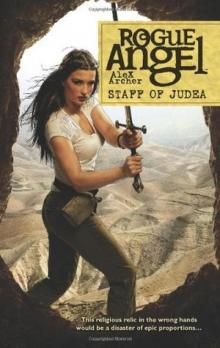 Staff of Judea
Staff of Judea Rogue Angel 55: Beneath Still Waters
Rogue Angel 55: Beneath Still Waters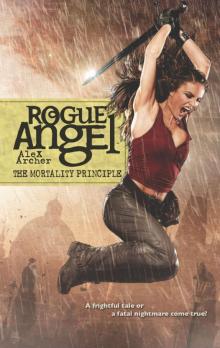 The Mortality Principle
The Mortality Principle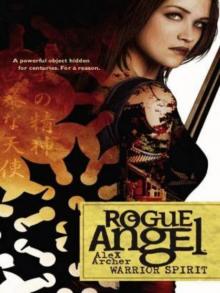 Warrior Spirit
Warrior Spirit Paradox
Paradox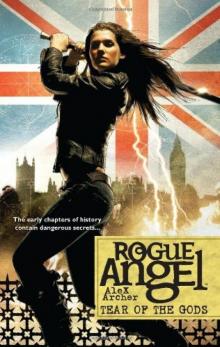 Tear of the Gods
Tear of the Gods Forbidden City
Forbidden City River of Nightmares (Rogue Angel)
River of Nightmares (Rogue Angel) Rogue Angel: The Secret of the Slaves
Rogue Angel: The Secret of the Slaves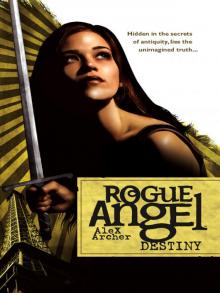 Destiny
Destiny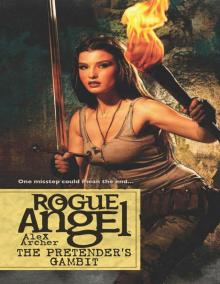 Rogue Angel 51: The Pretender's Gambit
Rogue Angel 51: The Pretender's Gambit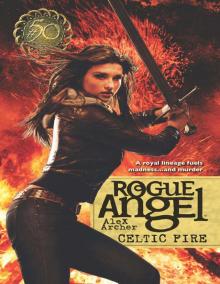 Celtic Fire
Celtic Fire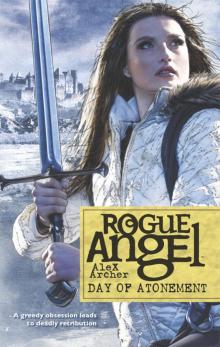 Rogue Angel 54: Day of Atonement
Rogue Angel 54: Day of Atonement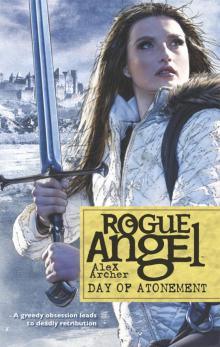 Day of Atonement
Day of Atonement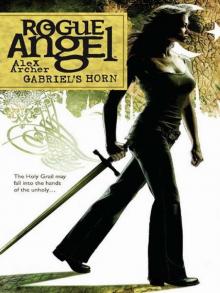 Rogue Angel: Gabriel's Horn
Rogue Angel: Gabriel's Horn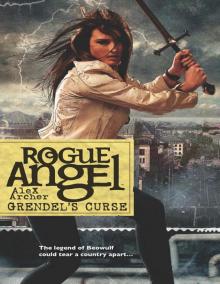 Grendel's Curse
Grendel's Curse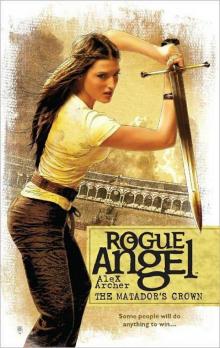 The Matador's Crown
The Matador's Crown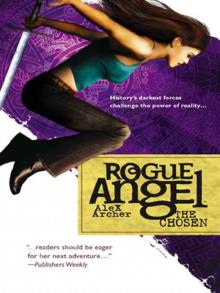 Rogue Angel: The Chosen
Rogue Angel: The Chosen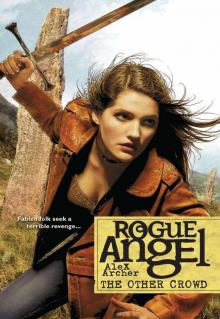 The Other Crowd
The Other Crowd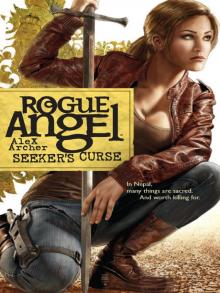 Seeker’s Curse
Seeker’s Curse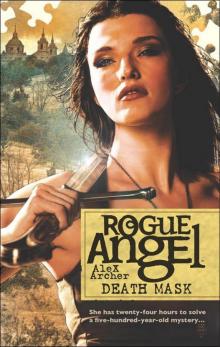 Rogue Angel 52: Death Mask
Rogue Angel 52: Death Mask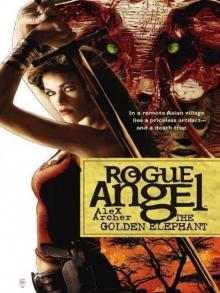 The Golden Elephant
The Golden Elephant Blood Cursed (Rogue Angel)
Blood Cursed (Rogue Angel)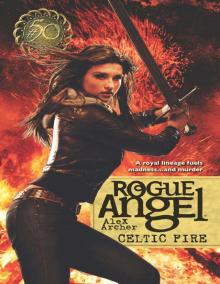 Celtic Fire (Rogue Angel)
Celtic Fire (Rogue Angel)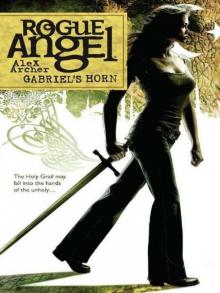 Gabriel's Horn
Gabriel's Horn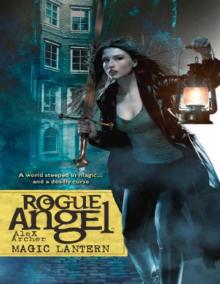 Magic Lantern (Rogue Angel)
Magic Lantern (Rogue Angel)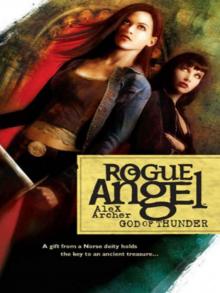 God of Thunder
God of Thunder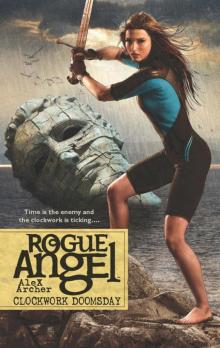 Clockwork Doomsday
Clockwork Doomsday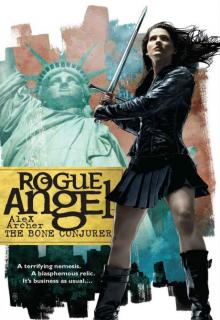 The Bone Conjurer
The Bone Conjurer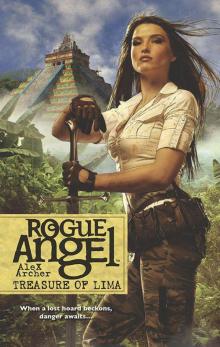 Treasure of Lima
Treasure of Lima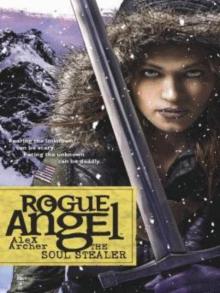 The Soul Stealer
The Soul Stealer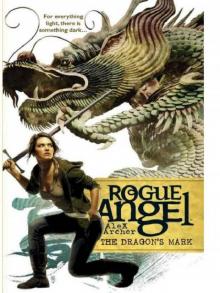 The Dragon’s Mark
The Dragon’s Mark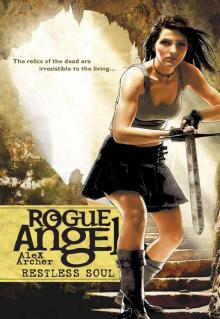 Restless Soul
Restless Soul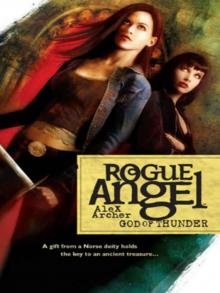 Rogue Angel: God Of Thunder
Rogue Angel: God Of Thunder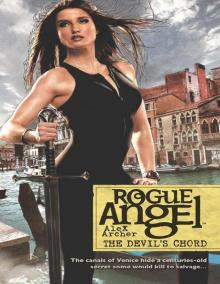 Rogue Angel 49: The Devil's Chord
Rogue Angel 49: The Devil's Chord Death Mask
Death Mask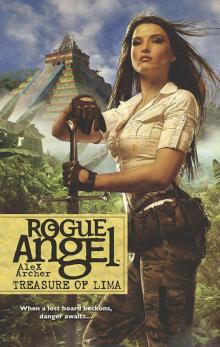 Rogue Angel 46: Treasure of Lima
Rogue Angel 46: Treasure of Lima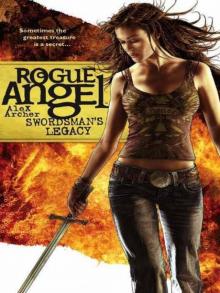 Swordsman's Legacy
Swordsman's Legacy The Oracle's Message
The Oracle's Message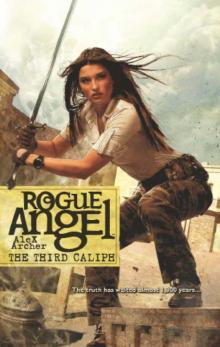 The Third Caliph
The Third Caliph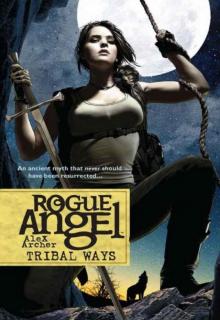 Tribal Ways
Tribal Ways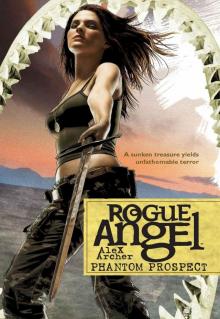 Phantom Prospect
Phantom Prospect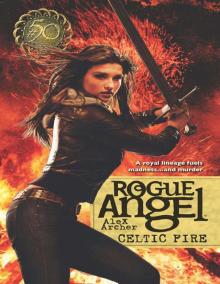 Rogue Angel 50: Celtic Fire
Rogue Angel 50: Celtic Fire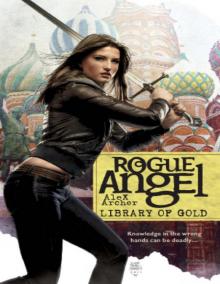 Library of Gold
Library of Gold Rogue Angel 53: Bathed in Blood
Rogue Angel 53: Bathed in Blood Sacred Ground
Sacred Ground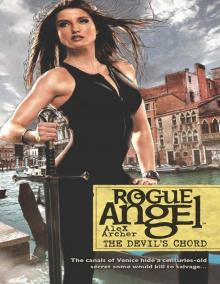 The Devil's Chord
The Devil's Chord Serpent's Kiss
Serpent's Kiss The Vanishing Tribe
The Vanishing Tribe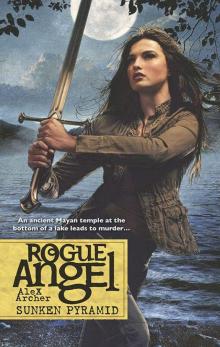 Sunken Pyramid
Sunken Pyramid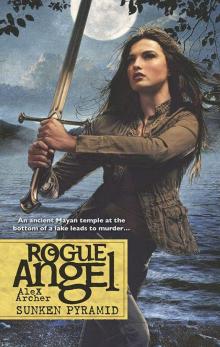 Sunken Pyramid (Rogue Angel)
Sunken Pyramid (Rogue Angel)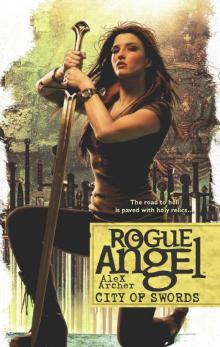 City of Swords
City of Swords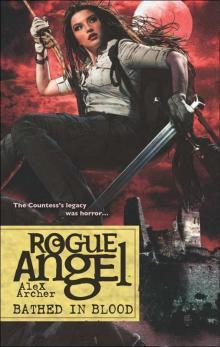 Bathed in Blood
Bathed in Blood The Lost Scrolls
The Lost Scrolls The Babel Codex
The Babel Codex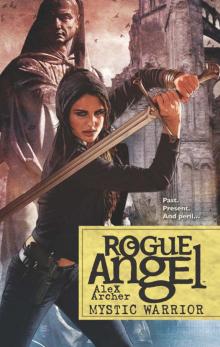 Mystic Warrior
Mystic Warrior Eternal Journey
Eternal Journey Beneath Still Waters
Beneath Still Waters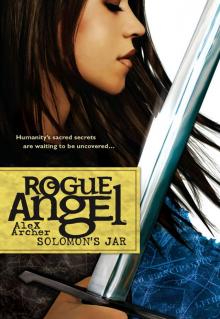 Solomon's Jar
Solomon's Jar Beneath Still Waters (Rogue Angel Book 55)
Beneath Still Waters (Rogue Angel Book 55) Cradle of Solitude
Cradle of Solitude Secret of the Slaves
Secret of the Slaves River of Nightmares
River of Nightmares Polar Quest
Polar Quest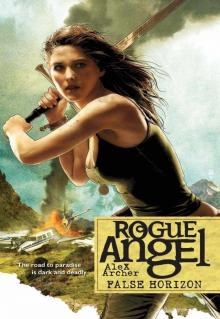 False Horizon
False Horizon